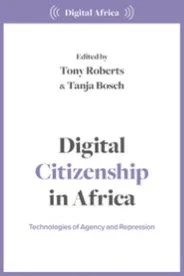Edited by Tony Roberts and Tanja Bosch
Since the so-called Arab Spring, citizens of African countries have continued to use digital tools in creative ways to ensure that marginalised voices are heard, and to demand for the rights they are entitled to in law: to freely associate, to form opinions, and to express them online without fear of violence or arrest. The authors of this compelling open access volume have brought to life this dramatic struggle for the digital realm between citizens and governments; documenting in vivid detail how citizens are using mobile and internet tools in powerful viral global campaigns to hold governments accountable and force policy change. With contributions from scholars across the continent, Digital Citizenship in Africa illustrates how citizens have been using VPNs, encryption, and privacy-protecting browsers to resist limits on their rights to privacy and political speech. This book dramatically expands our understanding of the vast and growing arsenal of tech tools, tactics, and techniques now being deployed by repressive governments to limit the ability of citizens to safely and openly express opposition to government and corporate actions. AI-enabled surveillance, covertly deployed disinformation, and internet shutdowns are documented in ten countries, concluding with recommendations on how to curb government and corporate power, and how to re-invigorate digital citizenship across Africa. The ebook editions of this book are available open access under a CC BY-NC-ND 4.0 licence on bloomsburycollections.com.
London: Zed Books, 2023. 256p.



